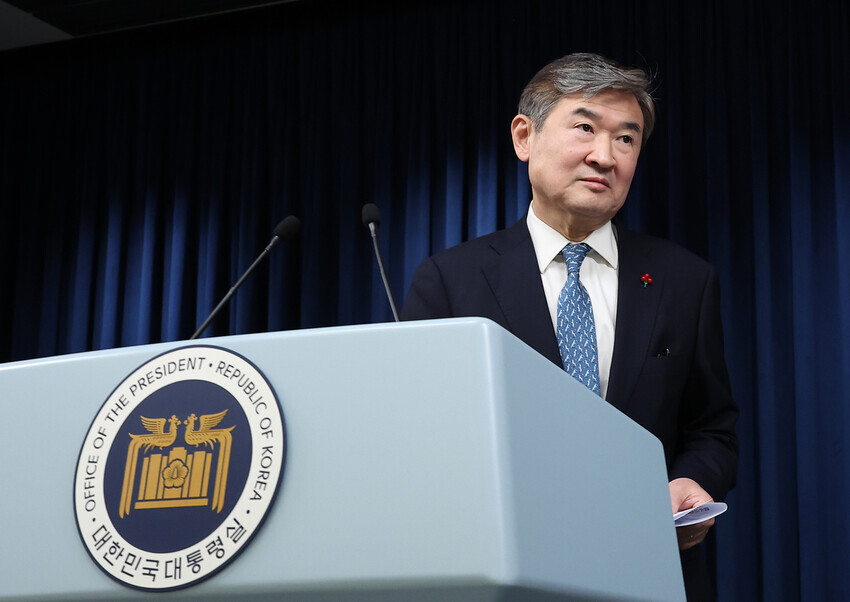hankyoreh
Links to other country sites 다른 나라 사이트 링크
Nominee for S. Korea’s spy chief shown to have accepted major sum in form of ‘rent’ from US oil giant

President Yoon Suk-yeol’s nominee to head the National Intelligence Service accepted large sums of money in the form of rent payments from the Korean subsidiary of US oil giant Exxon Mobil for around two years starting in 2017, the Hankyoreh confirmed on Tuesday.
Cho Tae-yong, the nominee for spy chief, has said that he was employed as a researcher at Keio University in Tokyo during the period in question. However, since Cho’s family was residing in Korea during that period, it’s curious that Cho received regular payments from Mobil Korea.
According to documents the Hankyoreh received from Democratic Party lawmaker Hong Ihk-pyo on Tuesday, Mobil Korea paid 320 million won (US$242,500) in “collateral security” for Cho’s house in Seoul’s Yongsan District from September 2017 to December 2019. That works out to a monthly payment of 11 million won paid directly to Cho.
Cho has tried to justify the payments by claiming that after retiring from his post as vice foreign minister in May 2017, he went to Keio University as a visiting researcher, and from September 2017, he began renting his home in what he says was “a legitimate process.”
Yet Cho’s wife and family remained in Seoul and lived at the Yongsan residence during his time in Tokyo. In a written reply to the National Assembly, Cho stated, “At the time, my oldest son was in the US. The rest of my family remained in Seoul.”
Official records of resident registration numbers indicate that both Cho and his wife registered the Yongsan house as their residence on Dec. 30, 2013. The official residence of neither party changed afterward. In a written response to Hong’s questions about the official residence of Cho’s wife, second son, and daughter, Cho claimed, “I will provide answers to such inquiries during my confirmation hearing.”
This is not the first instance of Mobil Korea providing monthly rent payments to a high-level public official in the form of collateral.
In 1997, Prime Minister Han Duck-soo received a down payment from Mobil Korea on his residence in Seoul’s Jongno District, which he sublet to the oil and gas giant’s Korean branch. The down payment amounted to 140 million won (US$106,066).
“US corporations paying money to high-level public officials and administrators by renting their private property cannot be seen as a common practice,” said Hong.
“We need to look further into the issue to ensure that US corporate interests are not regularly employing such means to exercise influence in high levels of the South Korean government,” Hong said.
“If Cho cannot adequately explain these payments, he should not be appointed as director of the National Intelligence Service.”
By Seo Young-ji, staff reporter
Please direct questions or comments to [english@hani.co.kr]

Editorial・opinion
![[Editorial] Penalties for airing allegations against Korea’s first lady endanger free press [Editorial] Penalties for airing allegations against Korea’s first lady endanger free press](https://flexible.img.hani.co.kr/flexible/normal/500/300/imgdb/original/2024/0502/1817146398095106.jpg) [Editorial] Penalties for airing allegations against Korea’s first lady endanger free press
[Editorial] Penalties for airing allegations against Korea’s first lady endanger free press![[Editorial] Yoon must halt procurement of SM-3 interceptor missiles [Editorial] Yoon must halt procurement of SM-3 interceptor missiles](https://flexible.img.hani.co.kr/flexible/normal/500/300/imgdb/child/2024/0501/17145495551605_1717145495195344.jpg) [Editorial] Yoon must halt procurement of SM-3 interceptor missiles
[Editorial] Yoon must halt procurement of SM-3 interceptor missiles- [Guest essay] Maybe Korea’s rapid population decline is an opportunity, not a crisis
- [Column] Can Yoon steer diplomacy with Russia, China back on track?
- [Column] Season 2 of special prosecutor probe may be coming to Korea soon
- [Column] Park Geun-hye déjà vu in Yoon Suk-yeol
- [Editorial] New weight of N. Korea’s nuclear threats makes dialogue all the more urgent
- [Guest essay] The real reason Korea’s new right wants to dub Rhee a founding father
- [Column] ‘Choson’: Is it time we start referring to N. Korea in its own terms?
- [Editorial] Japan’s rewriting of history with Korea has gone too far
Most viewed articles
- 1[Editorial] Penalties for airing allegations against Korea’s first lady endanger free press
- 260% of young Koreans see no need to have kids after marriage
- 3Months and months of overdue wages are pushing migrant workers in Korea into debt
- 4Bills for Itaewon crush inquiry, special counsel probe into Marine’s death pass National Assembly
- 5Historic court ruling recognizes Korean state culpability for massacre in Vietnam
- 6In rejecting statute of limitations defense in massacre case, Korean court faces up to Vietnam War a
- 7“Those souls can rest now”: Vietnam massacre survivor reacts to Korean court win
- 8[Reporter’s notebook] In Min’s world, she’s the artist — and NewJeans is her art
- 91 in 3 S. Korean security experts support nuclear armament, CSIS finds
- 10[Editorial] Yoon must halt procurement of SM-3 interceptor missiles